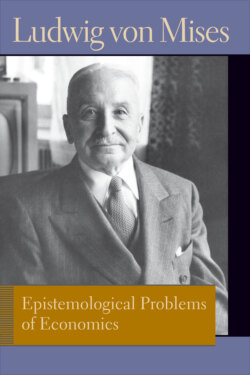Читать книгу Epistemological Problems of Economics - Людвиг фон Мизес - Страница 6
Оглавление[print edition page vii]
CONTENTS
Foreword to the Liberty Fund Edition, by Bettina Bien Greaves
Preface to the English-Language Edition
1 THE TASK AND SCOPE OF THE SCIENCE OF HUMAN ACTION
I The Nature and Development of the Social Sciences
1 Origin in the Historical and Normative Sciences
3 The Program of Sociology and the Quest for Historical Laws
4 The Standpoint of Historicism
5 The Standpoint of Empiricism
6 The Logical Character of the Universally Valid Science of Human Action
7 Sociology and Economics: Some Comments on the History of Economic Thought
II The Scope and Meaning of the System of A Priori Theorems
1 The Basic Concept of Action and its Categorial Conditions
2 A Priori Theory and Empirical Confirmation
3 Theory and the Facts of Experience
4 The Distinction between Means and Ends: The “Irrational”
[print edition page viii]
1 The Meaning of Neutrality with Regard to Value Judgments
2 Science and Technology: Economics and Liberalism
3 The Universalist Critique of Methodological Individualism
4 The Experience of a Whole and Scientific Cognition
5 The Errors of the Universalist Doctrine
6 “Objective” Meaning
IV Utilitarianism and Rationalism and the Theory of Action
1 Vierkandt’s Instinct Sociology
2 Myrdal’s Theory of Attitudes
3 The Critique of Rationalism by Ethnology and Prehistory
4 Instinct Sociology and Behaviorism
2 SOCIOLOGY AND HISTORY
Introduction
1 The Methodological and the Logical Problem
2 The Logical Character of History
3 The Ideal Type and Sociological Law
4 The Basis of the Misconceptions Concerning the Logical Character of Economics
5 History without Sociology
6 Universal History and Sociology
7 Sociological Laws and Historical Laws
8 Qualitative and Quantitative Analysis in Economics
9 The Universal Validity of Sociological Knowledge
Conclusion
3 CONCEPTION AND UNDERSTANDING
1 Cognition from Without and Cognition from Within
2 Conception and Understanding
3 The Irrational as an Object of Cognition
[print edition page ix]
4 Sombart’s Critique of Economics
5 Logic and the Social Sciences
4 ON THE DEVELOPMENT OF THE SUBJECTIVE THEORY OF VALUE
1 The Delimitation of the “Economic”
2 Preferring as the Basic Element in Human Conduct
3 Eudaemonism and the Theory of Value
4 Economics and Psychology
5 Economics and Technology
6 Monetary Calculation and the “Economic in the Narrower Sense”
7 Exchange Ratios and the Limits of Monetary Calculation
8 Changes in the Data
9 The Role of Time in the Economy
10 “Resistances”
11 Costs
5 REMARKS ON THE FUNDAMENTAL PROBLEM OF THE SUBJECTIVE THEORY OF VALUE
6 THE PSYCHOLOGICAL BASIS OF THE OPPOSITION TO ECONOMIC THEORY
Introduction
1 The Problem
2 The Hypothesis of Marxism and the Sociology of Knowledge
3 The Role of Resentment
4 Freedom and Necessity
Conclusion
7 THE CONTROVERSY OVER THE THEORY OF VALUE
8 INCONVERTIBLE CAPITAL
1 The Influence of the Past on Production
2 Trade Policy and the Influence of the Past
[print edition page x]
3 The Malinvestment of Capital
4 The Adaptability of Workers
5 The Entrepreneur’s View of Malinvestment
Index
